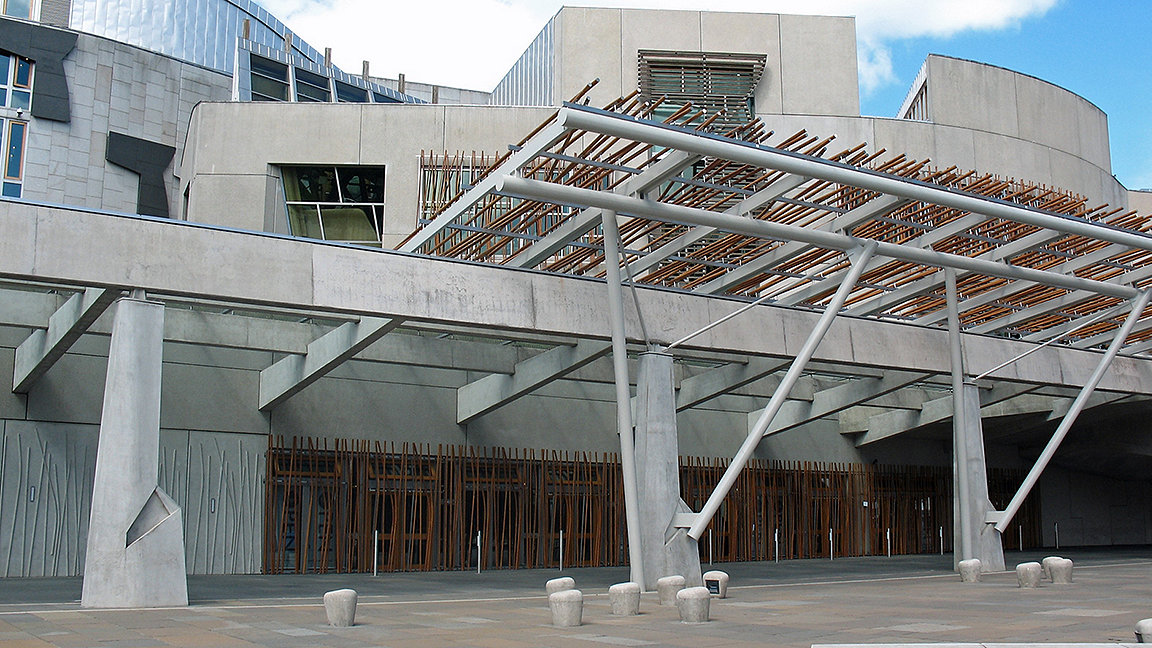
The Scottish Parliament building in Holyrood, central Edinburgh
Following the tragic events at Grenfell Tower in 2017, the Scottish government set up a ministerial working group on building and fire safety. This group in turn commissioned two panels, one to review compliance with and enforcement of building standards and the other fire safety.
In the recommendations that it published, the compliance and enforcement panel concluded that, although the core elements of the current building standards should be maintained, some reshaping of the system was necessary. Both panels also identified the potential for a national or central hub that could offer expertise in specialist and safety-critical areas in the design of complex buildings.
Hub among range of recommendations
The Building Standards Futures Programme Board was therefore set up in 2019 to give guidance and direction on developing and implementing the recommendations made by both panels.
Under the board's remit, recommendations are being taken forward through seven workstreams, which respectively concern:
- the future workforce
- design and construction compliance
- certification of design and construction
- technical handbooks
- digital transformation of services
- verification standards
- the model by which verification is carried out.
The latter workstream is reviewing the current model, in which the 32 Scottish local authorities are verifiers, and assessing scope for improvement. A Scottish building standards hub is being piloted as part of this work.
Pilot scopes out how revised model could work
The pilot was established to demonstrate the viability and sustainability of a national or central building standards hub and identify the improvements that could be made to the current model of service provision. Strengthening it involves the development of regional partnerships with the centralised administration of national building standards services, as well as specialist activities.
The pilot is managed and operated by two appointed directors and supported by Local Authority Building Standards Scotland (LABSS) and the Scottish government building standards division (BSD), in partnership with a host local authority, Fife Council. The hub formally commenced in May last year and will run for two years.
The work of the hub is being taken forward through seven concurrent workstreams of its own, as follows:
- implement a business plan, monitor progress, assess benefits, assess risk and report outcomes
- investigate how to establish a building standards hub, identifying responsibilities work-sharing practices, and scope for taking national decisions
- look into enhancing partnership working with the construction industry, including operational partnerships
- investigate the possibility of establishing a fire hub, supporting verifiers where required on applications with complex fire engineering
- consider setting up a structural engineering hub
- investigate whether to establish a digital hub
- look at establishing a knowledge and learning hub.
National collaboration through local authority
Since it began, the hub pilot has looked at a total of 13 hosting arrangements, settling on local authority as its preferred model because any council selected would already have:
- embedded IT infrastructure for the building standards service, with access to specialist systems used by all verifiers and robust technical support
- HR services
- a financial and budgetary framework
- procurement mechanisms
- access to a central premises and meeting facilities
- organisation familiar to potential staff.
While Fife Council currently hosts the pilot, the host of any permanent hub has yet to be confirmed. The pilot is undertaking extensive ongoing engagement with all local authorities in Scotland and the construction industry. The structure for a permanent hub has also been proposed, with a phased implementation planned.
The following national building standards services, previously provided by LABSS, have been embedded in the hub as well:
- administration of the Scottish Type Approval Scheme (STAS), a national system for housebuilders and developers that assesses and approves designs for standard buildings; all Scottish local authority verifiers accept STAS approvals in support of building warrant applications
- technical research to be published in information papers
- administration of dispute resolution
- administration of the consortia technical working group, which comprises seven local groups representing the local authorities in LABSS across Scotland; these local groups provide both management and technical expertise, gathering and sharing common working practices.
The resilience and resources offered by the hub, even during this pilot phase, have allowed for significantly more proactive work on these services; in particular STAS, which could improve consistency and efficiency in the assessment of building warrant applications, leading to overall improvement of the building standards system across Scotland.
Through stakeholder engagement, the pilot has identified scope for the hub to broker partnerships between local authority verifiers and private-sector experts so the latter can share their expertise, particularly when it comes fire and structural engineering.
'The resilience and resources offered by the hub, even during the pilot phase, have allowed for significantly more proactive work'
Stakeholders endorse pilot proposals
Feedback on the hub from local authority building standards teams, professional organisations, trade bodies, specialist experts and groups, education establishments, research establishments and developers has been overwhelmingly positive.
In addition, this engagement has resulted in new and renewed relationships between the hub, LABSS and stakeholders with many new areas of collaborative working identified, such as the following.
- The hub and stakeholders can provide each other with mutual support for learning and development activities.
- Hub members can attend stakeholder events.
- Stakeholders can inform priorities for verification guidance.
- The hub can support stakeholders' strategic development priorities by promoting better awareness of STAS.
- Together, hub and industry can promote building standards as a profession, recruiting verifiers from wider areas of the construction industry.
- Stakeholders will gain greater awareness of their responsibility for compliance by being in regular contact with the hub.
'Feedback on the hub has been overwhelmingly positive'
Verifiers given digital learning support
The hub is also now the primary vehicle for developing programmes to support local authority verifiers in digital transformation as well as learning and development. This support includes:
- a digital hub providing a strategic link between verifiers and stakeholders to ensure consistent and cost-effective digital transformation
- developing a virtual learning environment and learning management system for verifiers
- CPD provision for verifiers.
Several key operational aspects of a permanent hub have been established. As noted above, the hub will be hosted at one local authority, which will provide the necessary framework, facilities and systems essential to support its work and development. The final choice about which council will assume these duties has yet to be made.
Hub structure set for phased development
The pilot is proposing a phased development for the permanent structure of the hub, so key skills are brought on board swiftly and its work has a positive impact as soon as possible.
The various stakeholders anticipate that the hub will be funded from building warrant fees. As part of the building standards system, it will have clear benefits for the system's users. This can be seen when considering the overall aims of the workstream, which are to:
- provide excellent public service
- encourage efficiencies
- increase capacity to verify all types of construction work
- ensure investment in skills and new technology
- provide resilience
- increase consistency.
The proposed hub is due to be established by the end of the pilot on 1 May 2024 to ensure continuity of service.
At a Building Standards Future Programme Board meeting in February, the hub directors gave a presentation on how the building standards hub would be hosted and structured, its scope, capabilities and finances in a comprehensive business case report. The board subsequently agreed that the report and presentation set out the proper basis for a permanent hub to improve building standards services.

